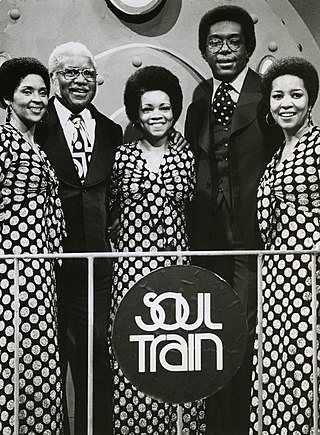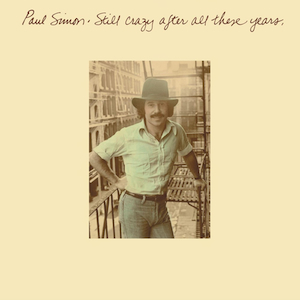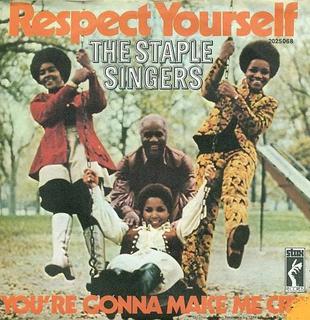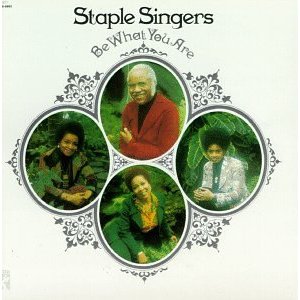
The Staple Singers were an American gospel, soul, and R&B singing group. Roebuck "Pops" Staples, the patriarch of the family, formed the group with his children Cleotha, Pervis, and Mavis. Yvonne replaced her brother when he was drafted into the U.S. Army, and again in 1970. They are best known for their 1970s hits "Respect Yourself", "I'll Take You There", "If You're Ready ", and "Let's Do It Again". While the family name is Staples, the group used "Staple" commercially.

I Never Loved a Man the Way I Love You is the tenth studio album by American singer Aretha Franklin, released on March 10, 1967 by Atlantic Records. It was Franklin's first release under her contract with the label, following her departure from Columbia Records after nine unsuccessful jazz standard albums, and marked a commercial breakthrough for her, becoming her first top 10 album in the United States, reaching number 2 on the Billboard 200. Two singles were released to promote the album: "Respect" and "I Never Loved a Man ". The former topped the Billboard Hot 100, while latter reached the top 10.
Southern soul, also called Country Soul is a type of Soul and Country Music that emerged from the Southern United States. The music originated from a combination of styles, including blues, country, early R&B, and a strong gospel influence that emanated from the sounds of Southern black churches. Bass guitar, drums, horn section, and gospel roots vocal are important to soul groove. This rhythmic force made it a strong influence in the rise of funk music. The terms "deep soul", "country soul", "downhome soul" and "hard soul" have been used synonymously with "Southern soul".p. 18

Back in '72 is the sixth studio album by American rock singer-songwriter Bob Seger, released in 1973. It was the first new album on Seger's manager Punch Andrews' label, Palladium Records, to be released under their distribution deal with the Reprise division of Warner Bros. Records and one of three early Seger albums that has never been reissued on CD.

Stranger in Town is the tenth studio album by American rock singer Bob Seger and his second with the Silver Bullet Band, released by Capitol Records in May 1978. As with its predecessor, the Silver Bullet Band backed Seger on about half of the songs and the Muscle Shoals Rhythm Section backed Seger on the other half.

Still Crazy After All These Years is the fourth solo studio album by American singer-songwriter Paul Simon, released on October 17, 1975, by Columbia Records. Recorded and released in 1975, the album produced four U.S. Top 40 hits: "50 Ways to Leave Your Lover", "Gone at Last", "My Little Town", and the title track. It won two Grammy Awards for Album of the Year and Best Male Pop Vocal Performance in 1976.

Christmas and the Beads of Sweat is the fourth album by New York-born singer, songwriter, and pianist Laura Nyro. The album was released on the Columbia Records label in November 1970 after Nyro had recorded it in the early summer with producers Felix Cavaliere and Arif Mardin. Whilst Nyro had handed over production reins, she was still in control of the project and co-arranged her compositions.

Machine Gun is the debut studio album by Commodores, released on July 22, 1974, on Motown Records.

"I'll Take You There" is a song written by Al Bell, and originally performed by soul/gospel family band the Staple Singers. The Staple Singers version, produced by Bell, was released on Stax Records in February 1972, and spent a total of 15 weeks on the charts and reached #1 on the Billboard Hot 100. By December 1972, it had sold 2 million units and is ranked as the 19th biggest American hit of 1972. It remains one of the best-selling gospel songs of all time.

A Funky Situation is a studio album by the American musician Wilson Pickett, released in 1978.

Be Altitude: Respect Yourself is a soul album by The Staple Singers released on February 14, 1972.

Skynyrd's First and...Last was the original name of the posthumous compilation album first released in 1978 by the rock band Lynyrd Skynyrd. In 1998, it was repackaged, renamed and re-released as Skynyrd's First: The Complete Muscle Shoals Album, being expanded to include eight additional tracks – four of which were previously unreleased and four which would be re-recorded for (Pronounced 'Lĕh-'nérd 'Skin-'nérd). As the renamed title suggests, the album was recorded at Muscle Shoals Sound Studio in Alabama. Originally intended to be their debut album it was shelved, making (Pronounced 'Lĕh-'nérd 'Skin-'nérd) their actual debut. The album was certified Gold on September 8, 1978 and Platinum on November 10, 1978 by the RIAA.

A Moment's Pleasure is a 1979 album by R&B musician Millie Jackson. It peaked at #47 on the Top R&B/Hip-Hop Albums and #144 on The Billboard 200 chart. It includes the singles "Never Change Lovers In The Middle of the Night", "Kiss You All Over" and the title track.

So Damn Happy is the thirty-fifth studio album by American singer Aretha Franklin. Her first studio album in five years. The album featured the Grammy Award-winning track "Wonderful", a single co-written and produced by Ron "Amen-Ra" Lawrence.

Movin' On is the third studio album by the Commodores, released by Motown Records in 1975.

"Respect Yourself" is a song by American R&B/gospel group the Staple Singers. Released in late 1971 from their album Be Altitude: Respect Yourself, the song became a crossover hit. The Staple Singers' version peaked at No. 12 on the Hot 100, No. 2 on the Hot Soul Singles chart, and is one of the group's most recognizable hits. In 2002, the song was inducted into the Grammy Hall of Fame, and in 2010 it was ranked #468 on the Rolling Stone list of the 500 Greatest Songs of All Time, moving down 4 spots from #464 in 2004.

Simple Things is the 8th album by American singer-songwriter Carole King, released in 1977. It is her first album on the Avatar / Capitol label.

Be What You Are is a soul album by the Staple Singers, released on December 8, 1973. It reached number 13 on the Billboard Top Soul LPs chart. The first single, "Be What You Are", fared poorly; however, the follow-up, "If You're Ready ", was a top ten hit, peaking at number nine on the Billboard Hot 100 and number one on the R&B Singles chart. The third single, "Touch a Hand, Make a Friend" charting at number 23 on the Hot 100 and number three on the R&B chart in 1974.

Wilson Pickett in Philadelphia is the eleventh studio album by singer Wilson Pickett released in 1970. After cutting many of his earlier albums in the Deep South, Pickett headed to Philadelphia to work with Gamble and Huff at Sigma Sound Studios. The album features two of Pickett's most popular singles from the early 1970s - "Engine No. 9" and "Don't Let the Green Grass Fool You".

Oh What a Feeling is a studio album by American R&B, soul and gospel singer Mavis Staples. It was released on July 16, 1979, by Warner Bros. Records.



















